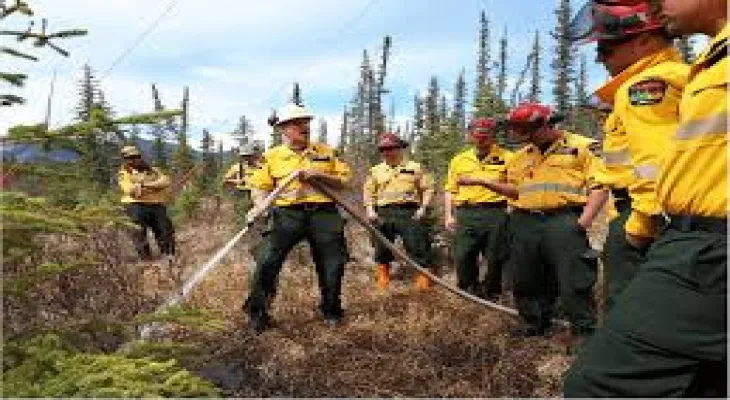Search here
Newspaper
Search here

Arab Canada News
News

Published: April 17, 2024
When Aaron Kurd watched the news coverage of the historic wildfire season in Canada in 2023, he couldn't help but pay attention, saying, "I saw how the wildfires affected communities here in Alberta and how they actually impacted the rest of Canada," "I felt like this could be a reason where I could contribute."
Kurd, 26, applied for a job in wildfire fighting in Alberta and is now among more than 500 people trained by Alberta Wildfire for this season, which has already begun in the province. Alberta Wildfire oversees the management of wildfires in the province's forest protection area. Last year, around mid-April, the department said 562 people were trained.
Kurd served for three years in the first regiment of the Royal Canadian Horse Artillery, and he said his military training made him perfectly suited for this role.
He said, "I told myself: My skills in the army can translate to wildfire fighting, and I can be of help to their teams."
"I thought I would get good benefits and work as part of an organization bigger than myself."
Recruiters like Kurd recently completed a week of training in Hinton, Alta, by finishing a practical strategy and tactical exercise that saw them unloading equipment from a helicopter, setting up pumps and hoses near several fires, and working to extinguish them.
Alberta Wildfire said there would be about 850 firefighters this season, including 100 additional firefighters funded by the budget.
The new recruits are then sent to their designated forest areas, where they will undergo an additional two weeks of training and be paired with a mentor to complete at least 150 hours of frontline training before they are considered certified.
Longer Seasons
A large part of Canada is experiencing a drought, with parts of Alberta facing harsh and exceptional conditions.
Josee St. Onge, an information officer at Alberta Wildfire, said that although the province has seen some snow in the Rocky Mountains recently, it's not enough, and they expect an increased fire risk as the snow melts.
She continued, "We are also entering a somewhat critical time for wildfires in Alberta because we are seeing a lot of exposed dry vegetation."
And because the plants have not turned green yet, St. Onge said, fires can ignite and spread quickly and easily.
Kyle Fitzpatrick, a wildfire training specialist at Alberta Wildfire, said the longer and more intense season could negatively impact firefighters.
He added, "It requires us to be very clear about what exhaustion and cumulative fatigue look like, along with some mental health issues that can arise from working long shifts for several days throughout the entire summer."
Kurd said his fellow crew members have shown a lot of support when it comes to dealing with mental health issues, and he focuses on coping mechanisms that he knows work for him.
"I love to exercise. I enjoy my alone time, and sometimes I separate myself from my job if it gets too hectic. Then I just focus on myself and what I need to do."
Mental Health Conversations
Nicole Galambos, director of the Hinton Training Centre, said the organization is trying to normalize talking about mental health.
She added, "New crew members learned about safety, which includes physical safety as well as psychological safety."
"Mental health risks are just as important, and we need to make sure we're trying to introduce that into our daily conversations and build the necessary tools to recognize when people are struggling or need someone to talk to."
Discussing Fatalities
Eight people died while working on wildfires last season, according to a draft research paper from Natural Resources Canada that has not been peer-reviewed.
Galambos said part of the training for new recruits includes thinking about the reasons behind the fatalities from wildfires.
She said, "We are definitely open to talking about the past as a learning experience. So what can we learn from those truly unfortunate fatalities, deaths, and serious injuries, and empower people to understand their roles and rights in refusing dangerous work and speaking up if they feel uncomfortable?"
Kurd is well aware of the risks of this job.
He added, "That's something we have to accept while doing our job, it's something that could happen to any of us in circumstances that weren't necessarily within our control."
"But we have trained as much as possible to ensure that we can control everything that is under our control - and in that way, we keep ourselves safe as much as possible."
Comments